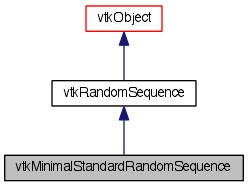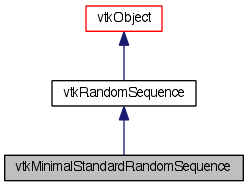Park and Miller Sequence of pseudo random numbers. More...
#include <vtkMinimalStandardRandomSequence.h>


Public Types | |
| typedef vtkRandomSequence | Superclass |
Public Member Functions | |
| virtual int | IsA (const char *type) |
| vtkMinimalStandardRandomSequence * | NewInstance () const |
| void | PrintSelf (ostream &os, vtkIndent indent) |
| void | SetSeed (int value) |
| void | SetSeedOnly (int value) |
| int | GetSeed () |
| virtual double | GetValue () |
| virtual void | Next () |
| virtual double | GetRangeValue (double rangeMin, double rangeMax) |
Static Public Member Functions | |
| static int | IsTypeOf (const char *type) |
| static vtkMinimalStandardRandomSequence * | SafeDownCast (vtkObjectBase *o) |
| static vtkMinimalStandardRandomSequence * | New () |
Protected Member Functions | |
| virtual vtkObjectBase * | NewInstanceInternal () const |
| vtkMinimalStandardRandomSequence () | |
| virtual | ~vtkMinimalStandardRandomSequence () |
Protected Attributes | |
| int | Seed |
Detailed Description
Park and Miller Sequence of pseudo random numbers.
vtkMinimalStandardRandomSequence is a sequence of statistically independent pseudo random numbers uniformly distributed between 0.0 and 1.0.
The sequence is generated by a prime modulus multiplicative linear congruential generator (PMMLCG) or "Lehmer generator" with multiplier 16807 and prime modulus 2^(31)-1. The authors calls it "minimal standard random number generator"
ref: "Random Number Generators: Good Ones are Hard to Find," by Stephen K. Park and Keith W. Miller in Communications of the ACM, 31, 10 (Oct. 1988) pp. 1192-1201. Code is at page 1195, "Integer version 2"
Correctness test is described in first column, page 1195: A seed of 1 at step 1 should give a seed of 1043618065 at step 10001.
Definition at line 46 of file vtkMinimalStandardRandomSequence.h.
Member Typedef Documentation
Reimplemented from vtkRandomSequence.
Definition at line 50 of file vtkMinimalStandardRandomSequence.h.
Constructor & Destructor Documentation
| virtual vtkMinimalStandardRandomSequence::~vtkMinimalStandardRandomSequence | ( | ) | [protected, virtual] |
Member Function Documentation
| static int vtkMinimalStandardRandomSequence::IsTypeOf | ( | const char * | name | ) | [static] |
Return 1 if this class type is the same type of (or a subclass of) the named class. Returns 0 otherwise. This method works in combination with vtkTypeMacro found in vtkSetGet.h.
Reimplemented from vtkRandomSequence.
| virtual int vtkMinimalStandardRandomSequence::IsA | ( | const char * | name | ) | [virtual] |
Return 1 if this class is the same type of (or a subclass of) the named class. Returns 0 otherwise. This method works in combination with vtkTypeMacro found in vtkSetGet.h.
Reimplemented from vtkRandomSequence.
| static vtkMinimalStandardRandomSequence* vtkMinimalStandardRandomSequence::SafeDownCast | ( | vtkObjectBase * | o | ) | [static] |
Reimplemented from vtkRandomSequence.
| virtual vtkObjectBase* vtkMinimalStandardRandomSequence::NewInstanceInternal | ( | ) | const [protected, virtual] |
Reimplemented from vtkRandomSequence.
Reimplemented from vtkRandomSequence.
| void vtkMinimalStandardRandomSequence::PrintSelf | ( | ostream & | os, |
| vtkIndent | indent | ||
| ) | [virtual] |
Methods invoked by print to print information about the object including superclasses. Typically not called by the user (use Print() instead) but used in the hierarchical print process to combine the output of several classes.
Reimplemented from vtkRandomSequence.
| static vtkMinimalStandardRandomSequence* vtkMinimalStandardRandomSequence::New | ( | ) | [static] |
Create an object with Debug turned off, modified time initialized to zero, and reference counting on.
Reimplemented from vtkObject.
| void vtkMinimalStandardRandomSequence::SetSeed | ( | int | value | ) |
Set the seed of the random sequence. The following pre-condition is stated page 1197, second column: valid_seed: value>=1 && value<=2147483646 2147483646=(2^31)-2 This method does not have this criterium as a pre-condition (ie it will not fail if an incorrect seed value is passed) but the value is silently changed to fit in the valid range [1,2147483646]. 2147483646 is added to a null or negative value. 2147483647 is changed to be 1 (ie 2147483646 is subtracted). Implementation note: it also performs 3 calls to Next() to avoid the bad property that the first random number is proportional to the seed value.
| void vtkMinimalStandardRandomSequence::SetSeedOnly | ( | int | value | ) |
Set the seed of the random sequence. There is no extra internal ajustment. Only useful for writing correctness test. The following pre-condition is stated page 1197, second column 2147483646=(2^31)-2 This method does not have this criterium as a pre-condition (ie it will not fail if an incorrect seed value is passed) but the value is silently changed to fit in the valid range [1,2147483646]. 2147483646 is added to a null or negative value. 2147483647 is changed to be 1 (ie 2147483646 is subtracted).
Get the seed of the random sequence. Only useful for writing correctness test.
| virtual double vtkMinimalStandardRandomSequence::GetValue | ( | ) | [virtual] |
| virtual void vtkMinimalStandardRandomSequence::Next | ( | ) | [virtual] |
Move to the next number in the random sequence.
Implements vtkRandomSequence.
| virtual double vtkMinimalStandardRandomSequence::GetRangeValue | ( | double | rangeMin, |
| double | rangeMax | ||
| ) | [virtual] |
Convenient method to return a value in a specific range from the range [0,1. There is an initial implementation that can be overridden by a subclass. There is no pre-condition on the range: - it can be in increasing order: rangeMin<rangeMax - it can be empty: rangeMin=rangeMax - it can be in decreasing order: rangeMin>rangeMax
- Postcondition:
- result_in_range: (rangeMin<=rangeMax && result>=rangeMin && result<=rangeMax) || (rangeMax<=rangeMin && result>=rangeMax && result<=rangeMin)
Member Data Documentation
int vtkMinimalStandardRandomSequence::Seed [protected] |
Definition at line 103 of file vtkMinimalStandardRandomSequence.h.
The documentation for this class was generated from the following file:
- dox/Common/Core/vtkMinimalStandardRandomSequence.h
 1.8.0
1.8.0